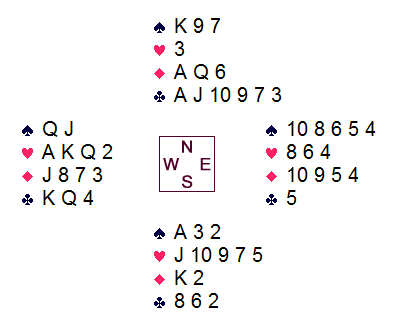

 |
 |
ANSWERS — Cornucopia #1


Five. That's right — nearly one-third of the field could
not identify their 38 high-card points. Moreover, one pair did not
bid any slam at all! The Fast Pairs event might be speedy, but nobody
said it was strong.
Suggested bidding (East dealer): 1♣-1♠-2NT-7NT


Number of possible bridge hands:
53,644,737,765,488,792,839,237,440,000
Number of possible auctions:
128,745,650,347,030,683,120,231,926,111,609,371,363,122,697,557
Auctions outnumber hands by a factor of 2.4 quintillion
to 1!
Surprised? Oddly enough, it all has to do with powers of 22.
Each available bid increases the auction count by a factor of 22,
and there are 35 possible bids. Doubles, and especially redoubles,
make the total greatly larger.
The actual formula for possible auctions is:
(4 × 2235 − 1) ÷
3
(For further details, see the Esoterica article, Counting Bridge Auctions.)



Despite your 18 high-card points west, you have no hope of defeating the
contract in your own hand. Declarer should be able to win five clubs
tricks, plus two each in spades and diamonds. Your only chance is that
North-South were extra-pushy, and that your partner holds either the
jack of clubs or the jack of hearts; the possession of either of these cards
should provide a fifth trick for the defense. An opening lead of the
♥2 is the standout choice, and it cannot give up
the contract.
As you can see, today there was no winning defense. The double hardly mattered, however, for no other pair bid the game.


Let's say that you are sitting west in an 18-table club game, as
Pair #1. A skip is called after round 9 (the last opportunity
in this case). A review of the boards played to this point will reveal
that already you have been the dealer nine times, and that your partner will
deal only in the remaining rounds. This deal ratio of 9 to 4
is not an equitable setup.
Many partnerships believe that good things happen more often when the
stronger player is the first to act. Anyone with an insight into this
movement's built-in flaw could choose his seat accordingly,
so as to maximize his chances. I have it on the best authority that
such things do occur. Sleazy behavior aside, this inequity
automatically is minimized by calling the skip, as nearly as possible,
after half the total rounds played — in this case, round
6 or 7. (Note: the North-South pairs are unaffected.)
Most major tournament directors routinely call the round at the midpoint
of the game, thereby obviating the issue.
Note: The ACBL's computer scoring program does not properly accommodate this issue either, because the software, after defaulting to the last available skip round, makes it difficult to change that setting.


Seeing twelve top tricks, the declarer in 3NT ran off the
major-suit winners, finding that a club-diamond squeeze had
developed against west, who was forced to unguard a suit. I didn't ask
every other declarer what happened, but I have a pretty good guess.
I believe that they all adhered religiously to the Sixth
Commandment of Bridge at Dante's Infernal: "Thou
Shalt Not Play Off Thy Last Trump". These players' mothers
taught them when they were little babies never to squander their trumps,
lest something bad happen. Most likely they tried to run the clubs;
when that didn't work out, the squeeze potential had vanished.
Many players go out of their way to reject this common source of an extra trick.


David Burnstine (aka David Bruce, 1900-1965) was ACBL Life
Master #1. In his day he was considered by many to be the best
bidder in the game. Burnstine invented the game-forcing
2♣ Opening Bid; he was a member of the legendary
Four Horsemen Team, and he won the first official Bridge World Championship,
in 1935.



Eric Rodwell made the 7♣ bid in the semi-finals
of the recent U.S. Bridge Federation Championships. I know, because
I was watching it, live. North had no trump to lead; so two spade ruffs
fulfilled the contract.
A wild gamble, do you say? Since 6♣ was bid
at the other table, Rodwell gained eleven imp, and won the match by
six! A wild gamble, did you say?
Note: Rodwell's team went on to win this event handily. We will be hearing more about this board.




The seven answers: Oswald Jacoby, Oswald Jacoby, Oswald Jacoby, Oswald Jacoby, Oswald Jacoby, Oswald Jacoby, Oswald Jacoby.
Note: although Charles Goren's name has appeared on more articles, many were written after his death. In fact, Goren's name still is in use today by certain publishers. Jacoby wrote his own material.